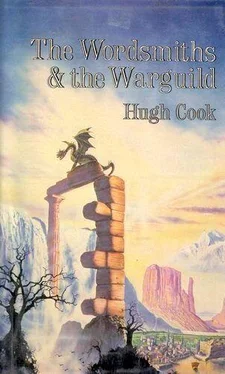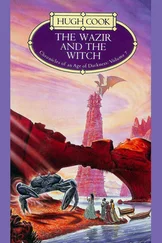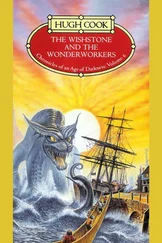Hugh Cook - The Wordsmiths and the Warguild
Здесь есть возможность читать онлайн «Hugh Cook - The Wordsmiths and the Warguild» весь текст электронной книги совершенно бесплатно (целиком полную версию без сокращений). В некоторых случаях можно слушать аудио, скачать через торрент в формате fb2 и присутствует краткое содержание. Жанр: Фэнтези, на английском языке. Описание произведения, (предисловие) а так же отзывы посетителей доступны на портале библиотеки ЛибКат.
- Название:The Wordsmiths and the Warguild
- Автор:
- Жанр:
- Год:неизвестен
- ISBN:нет данных
- Рейтинг книги:4 / 5. Голосов: 1
-
Избранное:Добавить в избранное
- Отзывы:
-
Ваша оценка:
- 80
- 1
- 2
- 3
- 4
- 5
The Wordsmiths and the Warguild: краткое содержание, описание и аннотация
Предлагаем к чтению аннотацию, описание, краткое содержание или предисловие (зависит от того, что написал сам автор книги «The Wordsmiths and the Warguild»). Если вы не нашли необходимую информацию о книге — напишите в комментариях, мы постараемся отыскать её.
The Wordsmiths and the Warguild — читать онлайн бесплатно полную книгу (весь текст) целиком
Ниже представлен текст книги, разбитый по страницам. Система сохранения места последней прочитанной страницы, позволяет с удобством читать онлайн бесплатно книгу «The Wordsmiths and the Warguild», без необходимости каждый раз заново искать на чём Вы остановились. Поставьте закладку, и сможете в любой момент перейти на страницу, на которой закончили чтение.
Интервал:
Закладка:
"Another time, bandage your hands before you fight," said the servitor, a rough-bearded man with a strange accent. "Until such time as your hands are battle-hardened."
"Where did you learn that?" said Togura.
"In another place, another time."
"Tell me about it."
"Not today. No – don't get up. Rest. I'll be back soon with something good."
"What?"
"Wait and see."
The servitor departed. Togura lay back in bed, staring at the cobwebs sprawled across the timbers overhead, and listened to the fury of the autumn storm which raged without. The wilderness weather was scattering the ilpses far and wide across the land, or blowing them out to sea; it was killing or dispersing the mobs of birds; it was grounding most of those quarrelsome machines which had not yet run out of fuel. The war weather was dealing with the pests and enemies unleashed by the odex, bringing a kind of peace back to the city state of Keep.
The servitor returned, bringing a two-handled drinking jug filled with something hot and sweltering.
"Drink," he said.
Togura did so. Warmth paunched in his belly and invaded his veins. His senses slurred. The colours of the darkened timbers overhead began to drift.
"Drink," said the servitor, encouraging him.
Togura drank his fill. Though he was lying in bed, he felt that he was floating. He tried to ask a question. On the third attempt, he managed to curl his tongue round the word.
"What is it?"
"Quaffle," said the servitor.
"And what's that?"
"A mixture of all good things. Alcohol, opium, hemlock, dark nightshade, the red-capped mushroom and the blue, a foreign herb called ginseng and a little oil of hashish. And honey, of course."
"I could learn to like it."
"You could learn too well," said the servitor, with a laugh. "But it's good for the sickness. Sleep now."
And, at his command, Togura drifted off into silk-blosomed drug dreams which suckled him with nectar and fed him on honey-basted melody cats.
He woke later, in darkness. The rain and the wind were still at work beyond the walls. He was alone, without the company of so much as a candle. Lying there in the darkness, he remembered Day Suet, in spring, cradling a tiny bird in her little hands, and laughing when it stained her fingers with a tiny bit of lime. Hot tears blistered his eyes.
He wept.
Later, in the darkness, he found the two-handled drinking jug. What was left in the bottom was cold to the touch. It sidled down his throat, cold as a snake, then transmuted itself to living fire. Sweating from the heat of the fire, and reeling from weariness, he allowed his bones to compose themselves once more for sleep.
When he woke, it was morning.
The servitor brought him mutton chops, swedes, rutabaga and water cress. He ate, ravenously. For lunch, there was leek soup, venison and the brains of a pig, with a side-helping of fried snails and pickled slugs. He devoured everything. In the evening, there was a slab of bread loaded down with beefsteak and a gill of milk, with blackbird pie to follow. He polished off the lot.
"Why am I so hungry?" said Togura.
"Good health makes you so," said the servitor.
For days, as Togura recovered from the effects of the unknown weapon which the strange woman from the odex had used to knock him unconscious, the cold rains of autumn lashed the town, washing away dead fish, drowned rats and the smells of blood and cheese. While Togura ate and slept, while the days shortened and the rains pounded down, the townspeople counted the cost of their orgiastic disaster with the odex, and argued whether it was a blessing or a disaster.
"Of course it was a disaster, no question about it!" said Shock the Cobbleman, who had broken both legs on the Night.
But not everyone was quick to agree.
On the debit side, at least thirty-four people had been killed, fifty houses flooded, seventeen other properties damaged or demolished, and incredible devastation wrought underground by war machines fighting to death in the mines. Through autumn and winter, the miners would be able to retrieve little gemstock; they would be too busy repairing and shoring up mineshafts.
On the credit side, three of the fighting machines, burrowing deep into the rock, had finally burst out into the daylight at the very bottom of Dead Man's Drop. Water was now cascading out of their escape tunnels. The problem of flooding in the mines, which had worsened as the miners delved deeper over the years, was now easing. This unexpected solution to the drainage problem meant that the total amount of gemstock available in the long term had greatly increased.
Bankers at banquet, gleaming with perspiration, toasted Togura Poulaan – also known as Barak the Battleman – with goblets of diluted ambrosia or strong mulled wine. The Gonderbrine mine, the largest in Keep, which had been threatening to default on its loans because assets underground had proved to be also underwater, had now negotiated a very satisfactory repayment schedule.
"To chaos," went one of the more drunken toasts. "To havoc."
That was daring, but another toast capped it.
"To the unexpected."
Now that, for a banker, was truly extraordinary.
While bankers celebrated, and while mienrs, though grumbling, admitted that they ultimately stood to benefit, a few dour, incorrigible pessimists argued that drainage would hasten subsidance, leading to a swift collapse of the town. They were ignored.
Meanhile, also on the credit side was the personal wealth so many had garnered. Many houses in Keep were now glutted with venison, and also with cheesestock, the name the people invented for the unholy mish-mash of half a hundred different cheeses which had resulted from the excessive generosity of the odex.
Others had gained birdmeat, fishmeat, gold, silver or interesting articles of metalwork. And many of those who had gained nothing had, nevertheless, abandoned themselves shamelessly on the Night; aware that they had fought and scrabbled and kicked and clawed, squabbling over the loot like so many carrion eaters, they were, for the most part, too ashamed to speak out and criticise the Wordsmiths, the odex or Togura Poulaan. Collective benefits and collective guilt served to nullify the chance of retribution.
Togura scarcely thought of the damage to the town and its people, but was deeply worried about the probable reaction of the Wordsmiths.
"Will I be punished?" he said.
"No, boy," said the servitor. "They're quite pleased with you, if anything."
Indeed, within the ranks of the Wordsmiths there was general agreement that the Night had been a good thing. For more than three decades they had explored the odex in a slow, cautious, deferential fashion, learning little of its practical use. Now, in one wild, rampaging Night, Togura Poulaan had taught them something very important about its use.
Brother Troop, the new Governor – the old one had died from an allergic reaction to an unfamiliar type of cheese – codified their new knowledge in Brother Troop's First Law of Odex: The volume, variety and reality of production of the odex increases in proportion to the length of unbroken linguistic stimulation and the variety of linguistic excitement employed for that stimulation.
In other words, a long shouting match with the odex, with plenty of people shouting, would lead to a great many things being produced, lots of those things being real objects instead of ilpses.
Brother Troop, pleased to be wearing the Governor's pink felt jacket and fur-lined codpiece, had his First Law of Odex inscribed on a piece of the finest timber available. He ordered it to be done in letters of fire, by which he meant red paint; what he actually received was a fine example of poker-work, but he decided that his words looked splendid even when rendered in charcoal.
Читать дальшеИнтервал:
Закладка:
Похожие книги на «The Wordsmiths and the Warguild»
Представляем Вашему вниманию похожие книги на «The Wordsmiths and the Warguild» списком для выбора. Мы отобрали схожую по названию и смыслу литературу в надежде предоставить читателям больше вариантов отыскать новые, интересные, ещё непрочитанные произведения.
Обсуждение, отзывы о книге «The Wordsmiths and the Warguild» и просто собственные мнения читателей. Оставьте ваши комментарии, напишите, что Вы думаете о произведении, его смысле или главных героях. Укажите что конкретно понравилось, а что нет, и почему Вы так считаете.












